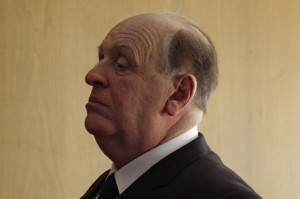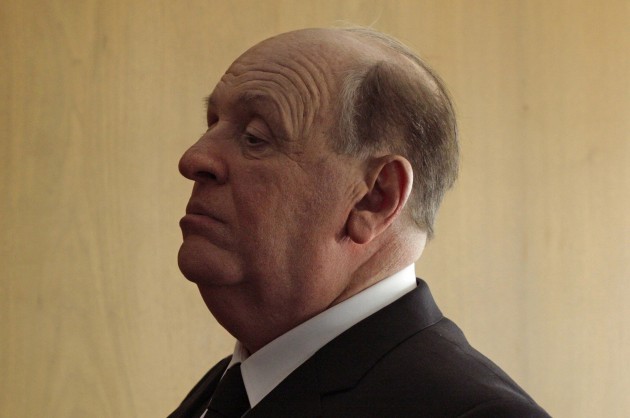
By Kenneth Turan
McClatchy-Tribune
Few directors put up as convincing a mask as Alfred Hitchcock or were as adept at using that public face to sell their work to the wider world. But what was the master of suspense really like in his private moments?
With Anthony Hopkins as the great helmsman and Helen Mirren as Alma Reville, his wife of more than 50 years, “Hitchcock” puts major league star power at the service of its peek-behind-closed-doors premise. But whatever that relationship was like in real life, this is one cinematic portrait of a marriage we could have lived without.
That’s not to say that “Hitchcock” is without its points of interest. Its pair of stars have their moments — a scene of the great man pitching a fit as he cleans leaves out of his pool is hard to resist — and the film buffs in the audience will enjoy having movie history circa 1959 come to life as Hitchcock simultaneously worries about his marriage and his chances of getting the groundbreaking chiller “Psycho” off the ground.
But, as directed by Sacha Gervasi from a script by John J. McLaughlin based on Steven Rebello’s book, “Hitchcock” is unable to overcome a pair of linked problems: Its protagonists turn out to be not especially interesting and the audience is not presented any convincing reason to care about what happens in their lives.
“Hitchcock” tries a number of strategies to make him a person of interest, including emphasizing his voyeuristic, Peeping Tom tendencies, presenting him for instance peering through a tiny hole to spy on actress Vera Miles (Jessica Biel).
Fearing this was not enough, the film dragoons the spirit of murderer and necrophiliac grave robber Ed Gein (Michael Wincott), one of the real-life inspirations for Robert Bloch’s original “Psycho” novel, into the proceedings, positing him as a kind of alter ego for Hitchcock, appearing to the director in visions and dreams. It’s about as appealing as it sounds.
The Gein business only serves to underline Hopkins’ rare inability to make a character come fully to life. Perhaps feeling constrained rather than freed by the considerable makeup he has to wear, Hopkins is unable to push his Hitchcock past the point of impersonation and turn him into a character we have an interest in spending quality time with.
Similarly, aside from some vivid moments of pique at her husband’s peculiarities, Mirren’s Alma is more a cipher than a compelling presence. “Hitchcock” tries to liven her story up with a flirtation with writer Whitfield Cook (Danny Huston), but to no avail.
What is diverting, at least for classic movie fans, is the film’s re-creation of the Hollywood of the time, with effective cameos by Michael Stuhlbarg as Hitchcock’s savvy agent (and later studio head) Lew Wasserman, Richard Portnow as Paramount topper Barney Balaban and Kurtwood Smith as Production Code enforcer Geoffrey Shurlock. Giving the film’s most alive performance is Scarlett Johansson as “Psycho” costar Janet Leigh.
What “Hitchcock” can’t convey is any sense of urgency about its characters’ predicaments. It’s hard to get worked up about whether “Psycho” does or doesn’t get made, and the potential fiscal sacrifices the Hitchcocks have to make, including giving up foie gras flown in from Paris in favor of some produced in Barstow, do not compel us either.
Though the official line is that “Hitchcock” is some kind of a love story, its sensibility is too decidedly odd to make that old-fashioned aspect of the story convincing. There is a listless quality to this production, and invasions of privacy aside, Alfred Hitchcock would definitely not approve.






